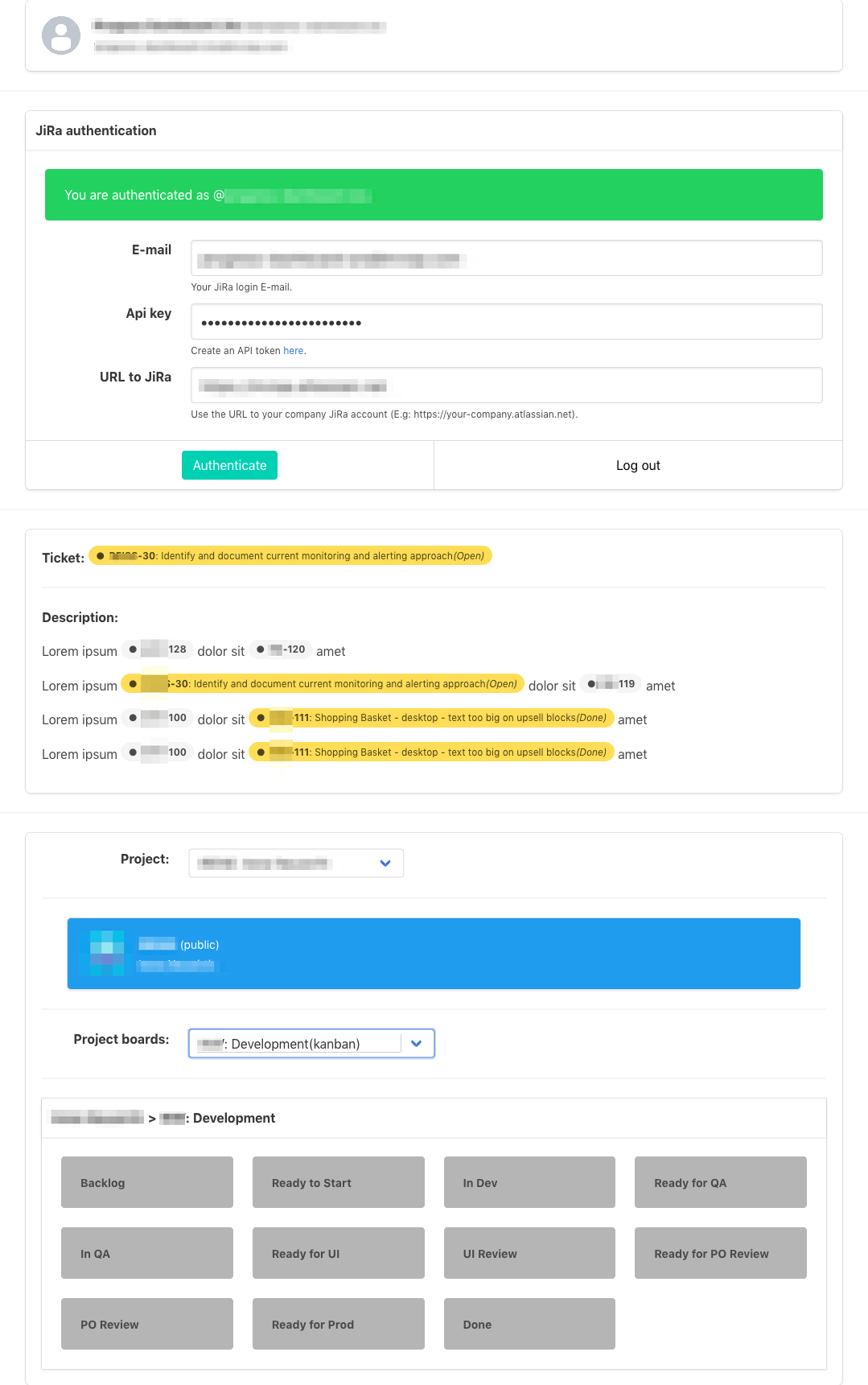README
Jira web component library
Web component library for JIRA.
Currently under development. Please keep in mind that it will change later.
Teaser

Getting started
Install package...
npm install jira-web-components --save
import "jira-web-components";
Or use a script tag...
<script src="https://unpkg.com/jira-web-components@0.8.0/public/bundle.js"></script>
In order to be able to communicate with JIRA you need a CORS proxy server. Please go to cors-anywhere for more information.
Example server (optimised for hosting on heroku):
// server.js
const host = process.env.HOST || '127.0.0.1';
const port = process.env.PORT || 4444;
const originBlacklist = parseEnvList(process.env.CORSANYWHERE_BLACKLIST);
const originWhitelist = parseEnvList(process.env.CORSANYWHERE_WHITELIST);
function parseEnvList(env) {
if (!env) {
return [];
}
return env.split(',');
}
const corsAnywhere = require('cors-anywhere');
corsAnywhere.createServer({
originBlacklist,
originWhitelist,
removeHeaders: [
'cookie',
'cookie2',
// Strip Heroku-specific headers
'x-heroku-queue-wait-time',
'x-heroku-queue-depth',
'x-heroku-dynos-in-use',
'x-request-start',
],
redirectSameOrigin: true,
httpProxyOptions: {
xfwd: false,
},
}).listen(port, host, function() {
console.log('Running CORS proxy on ' + host + ':' + port);
});
Or clone this repo, and look for the server.js in the project root.
Once you have the server script:
#!/bin/bash
export HOST=cors.my-website.com
export PORT=8080
export CORSANYWHERE_WHITELIST=https://my-website.com,http://my-website.com,http://test.my-website.com
node server.js
For testing only you can also use: https://cors-anywhere.herokuapp.com
Using the Components
Config
You have to have it somewhere on the top of the HTML code.
<jira-global-config cors="http://localhost:4444" safe="true"></jira-global-config>
Parameters:
cors: the cors server URL (see details above)safe: Iffalseit saves the email, api key, and url in the local storage. It's only recommended to use it if you have only one user. A safer way is to set it true and store this information on a server. You can use the<jira-auth>components public methods to authenticate.
Visual Components
These components render actual content (see functional components later).
Authentication form
<jira-auth-form></jira-auth-form>
Auth user card
<jira-auth-user-card></jira-auth-user-card>
Inline issue tag
<jira-issue-tag key="EX-123"></jira-issue-tag>
Project Card
<jira-project-card key="EX"></jira-project-card>
Project Dropdown
<jira-project-select key="EX"></jira-project-select>
Methods:
getProject= () =>object;
Events:
'jira-project-selected': {detail:object}
Project Board Dropdown
<jira-board-select project="EX" selected="123"></jira-board-select>
Methods:
getBoard= () =>object;
Events:
'jira-board-selected': {detail:object}
Project Board Panel
Shows board info with the given board id, and columns. (Recommended to use it in combination with the board select component)
<jira-board-panel bid="123"></jira-board-panel>
Text wrapper
Replaces the [JIRA:EX-123] issue ticket codes with <jira-issue> components.
<jira-text-wrapper>
<p>Lorem ipsum [JIRA:EX-123] dolor sit [JIRA:EX-456] amet.</p>
Lorem ipsum [JIRA:EX-123] dolor sit [JIRA:EX-456] amet.
<p>Lorem ipsum [JIRA:EX-123] dolor sit [JIRA:EX-456] amet.</p>
</jira-text-wrapper>
Combining Components
Some of the components can be combined. You can see a full example of these combinations here.
<jira-project-select>
<hr>
<jira-project-card></jira-project-card> <!-- the project card will always show the selected project -->
<hr>
<jira-board-select> <!-- the board select will always list the boards for the selected project -->
<hr>
<jira-board-panel></jira-board-panel> <!-- the board panel will always show the details for the selected board -->
</jira-board-select>
</jira-project-select>
Functional Components
These components only serve functional purpose by exposing public methods and emitting events. You can use them for you own componment implementations.
Example:
<!-- index.html -->
<jira-auth id="jira-auth"></jira-auth>
<!-- ... -->
<script>
var auth = document.getElementById('jira-auth');
addEventListener('DOMContentLoaded', function() {
auth.$on('jira-auth-status-changed', function(e){
console.log(e.detail === true ? 'You are logged in.' : 'You are logged out');
});
auth.setEmail('me@my-company.com');
auth.setApiKey('[MY_API_KEY_FOR_JIRA]');
auth.setUrl('https://my-company.atlassian.net');
auth.authenticate();
});
</script>
Auth
You can handle the authentication using this component.
<jira-auth></jira-auth>
Methods:
setEmail= (v:string) =>void;setApiKey= (v:string) =>void;setUrl= (v:string) =>void;getUserData= () =>object;getEmail= () =>string;getApiKey= () =>string;getUrl= () =>string;authenticate= async () =>void;isAuthenticated= () =>boolean;reset= () =>void;
Events:
'jira-auth-user-changed': {detail:object}'jira-auth-user-fetching-changed': {detail:boolean} - It's true when the data is being fetched from the API.'jira-auth-status-changed': {detail:boolean}'jira-auth-email-changed': {detail:string}'jira-auth-apikey-changed': {detail:string}'jira-auth-url-changed': {detail:string}
Issue
You can get info about an issue by using this component.
<jira-issue key="EX-123"></jira-issue>
Methods:
getIssue= () =>object;
Events:
'jira-issue-loaded': {detail:boolean}
Projects
You can get the all available projects.
<jira-projects></jira-projects>
Methods:
fetchProjects= async () => Promise<array>;getProjects= () =>array;
Events:
'jira-projects-loaded': {detail:boolean}'jira-projects-fetching-changed': {detail:boolean}
Project Boards
You can get the all available boards for a project.
<jira-boards project="EX"></jira-projects>
Methods:
serProject= () => void;fetchBoards= async () => Promise<array>;getBoards= () =>array;
Events:
'jira-boards-loaded': {detail:boolean}'jira-boards-fetching-changed': {detail:boolean}
Styleguide, examples and detailed documentation:
Click here for the documentation and examples!